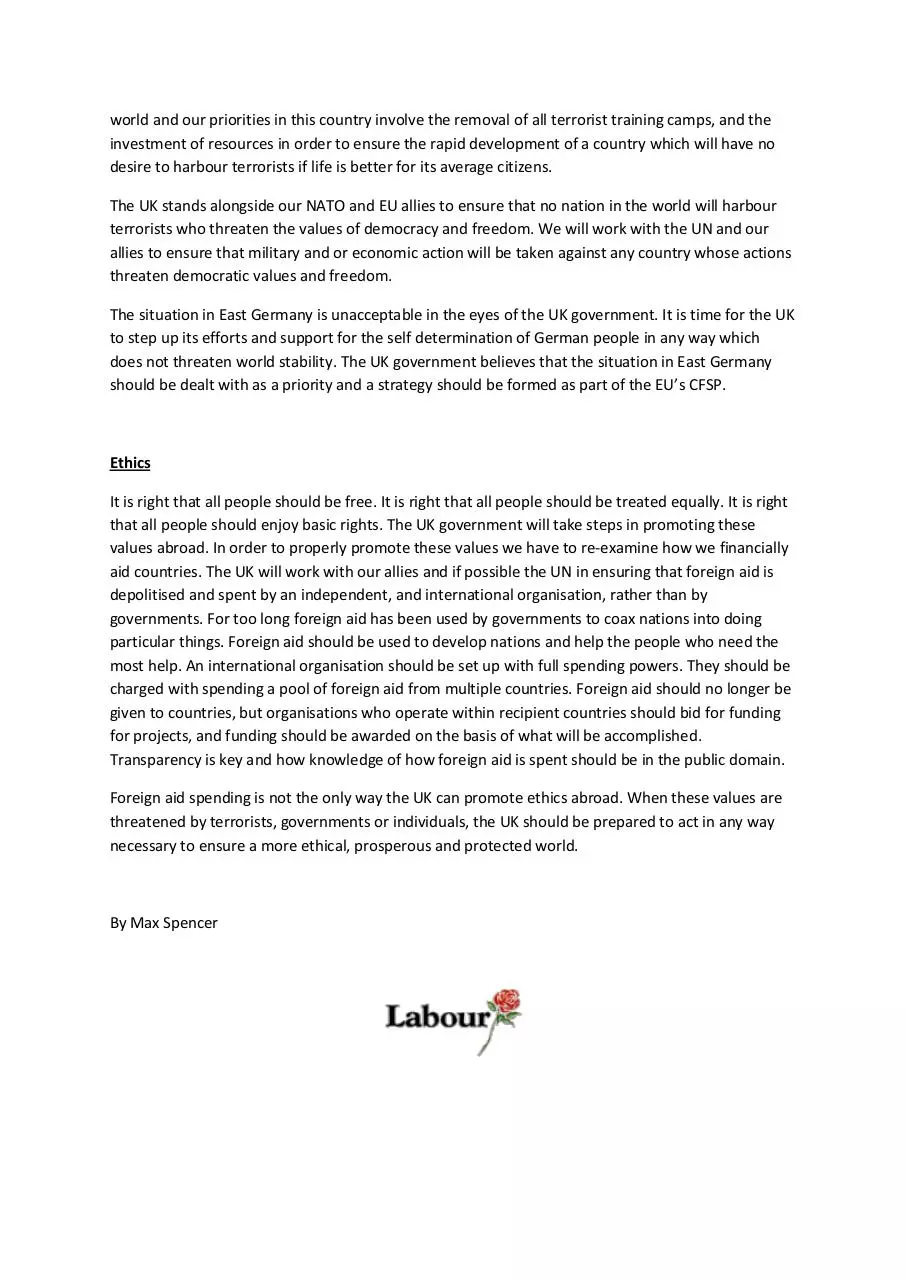White paper (PDF)
File information
Author: Rebecca
This PDF 1.5 document has been generated by Microsoft® Office Word 2007, and has been sent on pdf-archive.com on 17/11/2014 at 07:43, from IP address 88.150.x.x.
The current document download page has been viewed 4262 times.
File size: 249.57 KB (3 pages).
Privacy: public file



File preview
Prosperity, Protection and Ethics: The three pillars of UK foreign
policy.
Introduction
The days of the British colonial empire are gone and consigned to history.
So what is Britain’s place in the world today under a Labour led government? Our foreign policy
revolves around three pillars, peace, prosperity and ethics. It is the duty of the UK government to
encourage peace abroad in the hope it will make our own Island safer, it is the duty of the UK
government to ensure prosperity abroad in order to ensure prosperity at home and it is the duty of
the UK government to act with ethics at the forefront of everything we do on the world stage.
Prosperity
The UK will take a leading role in the development of European integration. The common market has
benefited many business, small, medium and large alike, and our goal is to seek deeper integration
with European Union countries after the ratification of the treaty of Maastrich. One of the major
implications of the treaty of Maastrich is a common foreign and security policy, with ethics,
prosperity and protection in mind, the UK will take a lead in forming the CFSP of the EU.
Whilst the EU forms an incredibly important part of the prosperity pillar of UK foreign policy we
need to look beyond Europe in an increasingly globalised world. It is time to see if the benefits of a
common European market can be expanded. We have the privilege of being a common wealth
countries and the possibility of a free trade agreement between countries such as Canada and
Australia should be considered as a priority of UK foreign policy within the prosperity pillar.
Protection
The world has become interconnected. The world has also become more unstable. Events in the USA
and Sudan have shaken the world and the UK’s foreign policy needs to reflect this. Our policy in
Sudan is once again informed by the three pillars of UK foreign policy, protection, prosperity and
ethics. We currently have an opportunity to stabilise a country which has experienced prolonged
periods of instability and civil war. We will work either our NATO partners to ensure stability in this
country in order to provide safety from terrorism to our own citizens. A safer Sudan means a safer
world and our priorities in this country involve the removal of all terrorist training camps, and the
investment of resources in order to ensure the rapid development of a country which will have no
desire to harbour terrorists if life is better for its average citizens.
The UK stands alongside our NATO and EU allies to ensure that no nation in the world will harbour
terrorists who threaten the values of democracy and freedom. We will work with the UN and our
allies to ensure that military and or economic action will be taken against any country whose actions
threaten democratic values and freedom.
The situation in East Germany is unacceptable in the eyes of the UK government. It is time for the UK
to step up its efforts and support for the self determination of German people in any way which
does not threaten world stability. The UK government believes that the situation in East Germany
should be dealt with as a priority and a strategy should be formed as part of the EU’s CFSP.
Ethics
It is right that all people should be free. It is right that all people should be treated equally. It is right
that all people should enjoy basic rights. The UK government will take steps in promoting these
values abroad. In order to properly promote these values we have to re-examine how we financially
aid countries. The UK will work with our allies and if possible the UN in ensuring that foreign aid is
depolitised and spent by an independent, and international organisation, rather than by
governments. For too long foreign aid has been used by governments to coax nations into doing
particular things. Foreign aid should be used to develop nations and help the people who need the
most help. An international organisation should be set up with full spending powers. They should be
charged with spending a pool of foreign aid from multiple countries. Foreign aid should no longer be
given to countries, but organisations who operate within recipient countries should bid for funding
for projects, and funding should be awarded on the basis of what will be accomplished.
Transparency is key and how knowledge of how foreign aid is spent should be in the public domain.
Foreign aid spending is not the only way the UK can promote ethics abroad. When these values are
threatened by terrorists, governments or individuals, the UK should be prepared to act in any way
necessary to ensure a more ethical, prosperous and protected world.
By Max Spencer
Download White paper
White paper.pdf (PDF, 249.57 KB)
Download PDF
Share this file on social networks
Link to this page
Permanent link
Use the permanent link to the download page to share your document on Facebook, Twitter, LinkedIn, or directly with a contact by e-Mail, Messenger, Whatsapp, Line..
Short link
Use the short link to share your document on Twitter or by text message (SMS)
HTML Code
Copy the following HTML code to share your document on a Website or Blog
QR Code to this page

This file has been shared publicly by a user of PDF Archive.
Document ID: 0000194495.